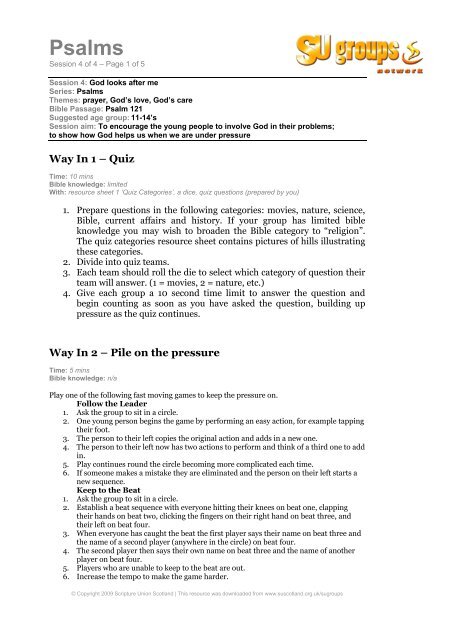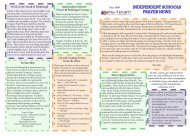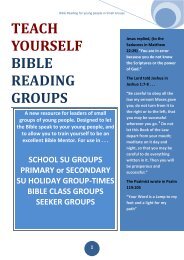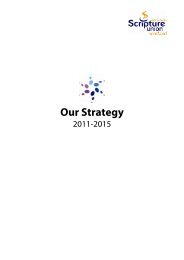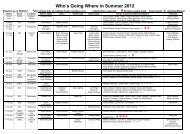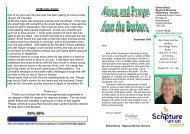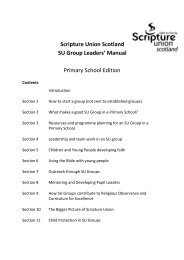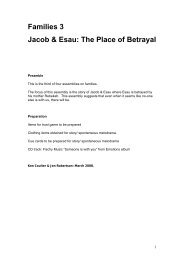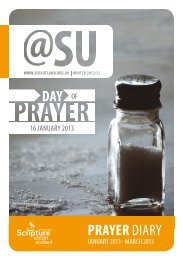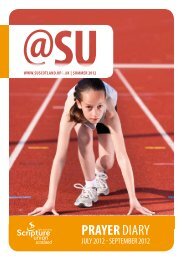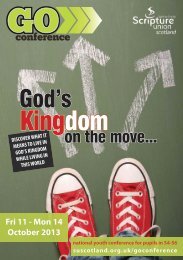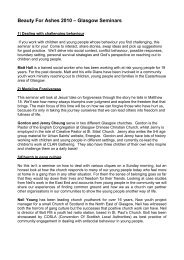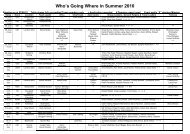Session Four - The Psalms - Scripture Union Scotland
Session Four - The Psalms - Scripture Union Scotland
Session Four - The Psalms - Scripture Union Scotland
- No tags were found...
Create successful ePaper yourself
Turn your PDF publications into a flip-book with our unique Google optimized e-Paper software.
<strong>Psalms</strong><br />
<strong>Session</strong> 4 of 4 – Page 1 of 5<br />
<strong>Session</strong> 4: God looks after me<br />
Series: <strong>Psalms</strong><br />
<strong>The</strong>mes: prayer, God’s love, God’s care<br />
Bible Passage: Psalm 121<br />
Suggested age group: 11-14’s<br />
<strong>Session</strong> aim: To encourage the young people to involve God in their problems;<br />
to show how God helps us when we are under pressure<br />
Way In 1 – Quiz<br />
Time: 10 mins<br />
Bible knowledge: limited<br />
With: resource sheet 1 ‘Quiz Categories’, a dice, quiz questions (prepared by you)<br />
1. Prepare questions in the following categories: movies, nature, science,<br />
Bible, current affairs and history. If your group has limited bible<br />
knowledge you may wish to broaden the Bible category to “religion”.<br />
<strong>The</strong> quiz categories resource sheet contains pictures of hills illustrating<br />
these categories.<br />
2. Divide into quiz teams.<br />
3. Each team should roll the die to select which category of question their<br />
team will answer. (1 = movies, 2 = nature, etc.)<br />
4. Give each group a 10 second time limit to answer the question and<br />
begin counting as soon as you have asked the question, building up<br />
pressure as the quiz continues.<br />
Way In 2 – Pile on the pressure<br />
Time: 5 mins<br />
Bible knowledge: n/a<br />
Play one of the following fast moving games to keep the pressure on.<br />
Follow the Leader<br />
1. Ask the group to sit in a circle.<br />
2. One young person begins the game by performing an easy action, for example tapping<br />
their foot.<br />
3. <strong>The</strong> person to their left copies the original action and adds in a new one.<br />
4. <strong>The</strong> person to their left now has two actions to perform and think of a third one to add<br />
in.<br />
5. Play continues round the circle becoming more complicated each time.<br />
6. If someone makes a mistake they are eliminated and the person on their left starts a<br />
new sequence.<br />
Keep to the Beat<br />
1. Ask the group to sit in a circle.<br />
2. Establish a beat sequence with everyone hitting their knees on beat one, clapping<br />
their hands on beat two, clicking the fingers on their right hand on beat three, and<br />
their left on beat four.<br />
3. When everyone has caught the beat the first player says their name on beat three and<br />
the name of a second player (anywhere in the circle) on beat four.<br />
4. <strong>The</strong> second player then says their own name on beat three and the name of another<br />
player on beat four.<br />
5. Players who are unable to keep to the beat are out.<br />
6. Increase the tempo to make the game harder.<br />
© Copyright 2009 <strong>Scripture</strong> <strong>Union</strong> <strong>Scotland</strong> | This resource was downloaded from www.suscotland.org.uk/sugroups
<strong>Psalms</strong><br />
<strong>Session</strong> 4 of 4 – Page 2 of 5<br />
Connecting 1 – Who can help<br />
Time: 10 mins<br />
Bible knowledge: limited<br />
With: list written on flip chart or white board, coloured sticky dots<br />
1. Often we can feel pressurised by events and circumstances which are out with our<br />
control. In the games pressure was caused by having a lot to do in a little time, which<br />
is fun in a game but not if there are exams looming. Young people face many<br />
challenges and it is important to emphasise that help is available.<br />
2. Ask young people, ‘Where do we find help’<br />
3. Psalm 121 was written by David who, having found himself under pressure, lifted his<br />
eyes up to the hills and asked the question “where does my help come from” What<br />
we see when we look into the hills may colour how we answer that question (discuss<br />
the pictures on the Quiz Categories resource sheet – we may think of laws safeguarding<br />
the vulnerable or armies keeping the country secure).<br />
4. When David looked to the hills he would have seen idols and temples dedicated to<br />
false gods, signs that many people were looking for help where it could not be found.<br />
David looked beyond the hills and claimed that his help came from God who had not<br />
only made the hills but had made everything.<br />
5. Read Psalm 121:1.<br />
6. When we need help we usually talk to somebody – write the following list on flip chart<br />
or white board: friend your own age, teacher, sports coach, youth worker, internet<br />
chat room acquaintance, pen pal, writer of an advice column, older brother or sister,<br />
parent or adult relative, complete stranger, police officer, minister, no one - I can<br />
work out my own problems, other. Ask group members to put a red sticky dot next to<br />
any of the people from the list they would turn to for advice. Look at the results to see<br />
which is the most common.<br />
7. Ask pupils to put a blue sticky dot next to the three people they have most respect for.<br />
Look at the results. Are the most respected people also the ones most likely to be<br />
turned to for advice Why/why not Discuss what makes group members respect or<br />
admire these people.<br />
8. Read Psalm 121:2.<br />
9. It is good to be able to talk over issues with someone we respect but it is fantastic to<br />
be able to involve God as well. Our help is then not just coming from someone who is<br />
vaguely familiar with our circumstances or has experience in similar matters but our<br />
help comes from God who created everything, who sees the entire picture and is in<br />
complete control of everything.<br />
10. Ask pupils what difference they think it would make if they could speak directly to<br />
God about their problems.<br />
Connecting 2 – How does God help<br />
Time: 10 mins<br />
Bible knowledge: limited<br />
With: resource sheet 2 ‘How does God help’, pens, highlighter pens<br />
1. Read Psalm 121 (this works well with two people – the first reading verses 1-2 and the<br />
second responding with 3-8).<br />
2. Ask the groups to highlight on the resource sheet how God helps and to write down<br />
what they think this means.<br />
3. This Psalm was one of a number enjoyed by pilgrims going to worship God in his<br />
Temple in Jerusalem. <strong>The</strong> journey was often long and hazardous and the Psalmist<br />
mentions three different dangers:<br />
• Losing your footing - the trip to Jerusalem was steep and could be<br />
treacherous. A slip of the foot could lead to serious injury or death.<br />
• <strong>The</strong> sun – a threat in a hot country like Palestine.<br />
© Copyright 2009 <strong>Scripture</strong> <strong>Union</strong> <strong>Scotland</strong> | This resource was downloaded from www.suscotland.org.uk/sugroups
<strong>Psalms</strong><br />
<strong>Session</strong> 4 of 4 – Page 3 of 5<br />
• <strong>The</strong> moon – night time had its own dangers with attack from people and<br />
animals.<br />
As they journeyed they prayed for safety and praised God in the knowledge that he<br />
would be with them.<br />
4. <strong>The</strong> Psalm has a wider application as we view life as a journey with God.<br />
5. <strong>The</strong> Psalm does not claim that trusting in God means no more stubbed toes.<br />
Christians still get injured, fall ill, are involved in accidents and have bad things<br />
happen to them to the same extent as everyone else. <strong>The</strong> difference lies in the fact that<br />
they know God is always with them every step of the way keeping them safe from evil<br />
and not letting their circumstances destroy them.<br />
Responding 1 – Praying for each other<br />
Time: 5 mins<br />
Bible knowledge: limited<br />
With: paper, pens<br />
1. This Psalm states that God would not let your foot slip.<br />
2. Ask group members to each draw an outline of a foot.<br />
3. Divide into pairs. Ask each person to write the name of their partner in their foot<br />
outline. If appropriate, they could tell their partner a particular thing that they would<br />
like prayer about.<br />
4. Challenge group members to take away the foot outline and continue to pray that God<br />
would keep their partner safe and would not let their foot slip in life.<br />
Responding 2 – My personal Psalm<br />
Time: 5 mins<br />
Bible knowledge: some<br />
1. <strong>The</strong> <strong>Psalms</strong> we have looked at in this series emphasise that we can talk to God about<br />
anything and everything. We can tell God how we feel if life is going well and we can<br />
even complain if we are angry or hurt. God loves us and is interested in every aspect<br />
of our lives.<br />
2. Challenge the young people to read the four <strong>Psalms</strong> (139, 32, 73 and 121) when they<br />
go home and then write their own Psalm to God (just between them and God).<br />
3. Encourage them to be honest in expressing themselves.<br />
4. Ask them to think about what they know of God’s character especially where it is<br />
relevant to their problems and include that in their Psalm aiming to conclude their<br />
Psalm on a positive note stating something that they believe to be true about God.<br />
© Copyright 2009 <strong>Scripture</strong> <strong>Union</strong> <strong>Scotland</strong> | This resource was downloaded from www.suscotland.org.uk/sugroups
Resource Sheet 1 – Quiz Categories<br />
1. movies1. 2. nature<br />
3. science 4. Bible<br />
5. current affairs 6. history
<strong>Psalms</strong><br />
<strong>Session</strong> 4 of 4 – Page 5 of 5<br />
Resource Sheet 2 - How does God help<br />
In the Psalm below, highlight the ways in which David is sure that God looks<br />
after him.<br />
Write on the sides what you think David means<br />
Psalm 121<br />
I look up to the hills,<br />
but where does my help come from<br />
My help comes from the LORD,<br />
who made heaven and earth.<br />
He will not let you be defeated.<br />
He who guards you never sleeps.<br />
He who guards Israel<br />
never rests or sleeps.<br />
<strong>The</strong> LORD guards you.<br />
<strong>The</strong> LORD is the shade that protects you<br />
from the sun.<br />
<strong>The</strong> sun cannot hurt you during the day,<br />
and the moon cannot hurt you at night.<br />
<strong>The</strong> LORD will protect you from all dangers;<br />
he will guard your life.<br />
<strong>The</strong> LORD will guard you as you come and<br />
go,<br />
both now and forever.<br />
NCV (anglicised edition) text used with permission from Authentic Media.<br />
© Copyright 2009 <strong>Scripture</strong> <strong>Union</strong> <strong>Scotland</strong> | This resource was downloaded from www.suscotland.org.uk/sugroups


